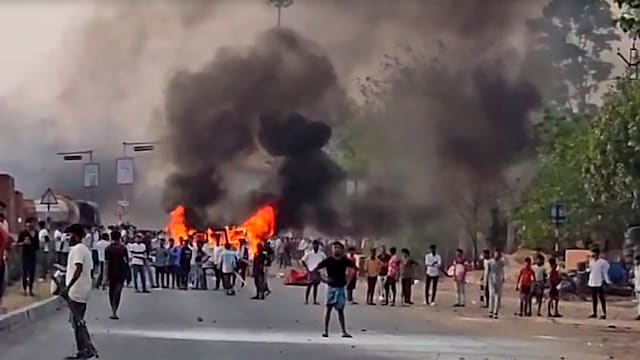Tensions Rise in Murshidabad Over Proposed Waqf (Amendment) Bill

News reports indicate significant unrest and violence in Murshidabad, West Bengal, in response to the Waqf (Amendment) Act, 2025. Demonstrations against the Waqf Amendment Act escalated into violence in early April 2025, particularly around April 11th. Tragically, the violence resulted in the deaths of at least three people, including a father and son in the Samserganj area. Many individuals, including at least 15 police officers, sustained injuries during the clashes. There have been widespread reports of vandalism, arson, and looting of both public and private property, including homes and shops. Some locals have reported losses running into lakhs of rupees.
In response to the escalating violence, the Calcutta High Court ordered the deployment of central security forces. The Union Ministry of Home Affairs sent around 900 BSF personnel to Murshidabad to restore order. CRPF personnel were also deployed. Over 150 people have been arrested in connection with the violence. The West Bengal Police have formed a nine-member Special Investigation Team (SIT) to probe the outbreak of violence.
While authorities stated that the situation was brought under control with the deployment of security forces, some locals remain fearful about the potential for renewed violence if the BSF will removed.

Political Reactions
West Bengal Chief Minister Mamata Banerjee stated that her government would not implement the new Waqf laws in the state. This stance has drawn criticism from BJP leaders. Some political figures have alleged that the violence was a “planned conspiracy” and that the Waqf Amendment Act was pushed with a “particular agenda.” The issue has reached the Supreme Court, with petitions filed challenging the constitutionality of the Act and seeking investigations into the violence.
Concerns about the Act:
Concerns raised about the Waqf Amendment Act include:
- Redefinition of “waqf” requiring individuals to have practiced Islam for five years to create a waqf.
- New composition of Waqf boards allowing for non-Muslim nominees, potentially reducing Muslim representation.
- Mandatory re-registration of waqf properties, causing concerns about potential alienation of assets.
Petention for President Rule
There have been recent petitions filed in the Supreme Court seeking the imposition of President’s Rule in West Bengal, citing concerns about law and order. Specifically, violence related to protests against the Waqf Amendment Act, and also other incidences of violence in the state, have been cited as reasons for this request.
The supreme court has heard these petitions, and has made comments relating to the courts position on the matter, and the courts position relating to encroachment of the executive branch. * There have also been calls from political figures, such as Mithun Chakraborty, and also political groups, such as the VHP and Shiv Sena, for the imposition of presidents rule.
The concept of “President’s Rule” in West Bengal, or any Indian state, refers to the potential imposition of direct central government rule. Here’s a breakdown of what that entails, and the current context: President’s Rule (Article 356): This is a provision in the Indian Constitution that allows the central government to take direct control of a state’s administration. It can be imposed if the state government is deemed unable to function according to constitutional provisions. Recent events in West Bengal, including instances of violence, have led to calls for the imposition of President’s Rule.
Status of Waqf Amendment Act in other States
As of Tuesday, April 22, 2025, no states have directly filed a petition challenging the constitutionality of the Waqf (Amendment) Act, 2025 in the Supreme Court.However, it’s important to note the following
Six states have approached the Supreme Court in support of the Act’s constitutionality. These states are
- Haryana
- Maharashtra
- Madhya Pradesh
- Rajasthan
- Chhattisgarh
- Assam
They argue that the amended law introduces transparency, structural reforms, and institutional accountability in the management of Waqf properties.
Several opposition-ruled states have voiced their opposition to the Act. For instance, the Dravida Munnetra Kazhagam (DMK) government in Tamil Nadu passed a resolution against the bill before it was passed by the Parliament and has also filed a writ petition in the Supreme Court challenging the Act. Similarly, the Jammu & Kashmir government also passed a resolution opposing the amendments.
The legal challenge is primarily being led by politicians, civil organizations, and advocates. Over 65 petitions have been filed in the Supreme Court by various individuals and entities, including Member of Parliament Asaduddin Owaisi, Aam Aadmi Party MLA Amanatullah Khan, the All India Muslim Personal Law Board (AIMPLB), and others. These petitioners argue that the Act infringes upon the religious freedom of Muslims and weakens the autonomy of Waqf boards.
While some states have actively supported the Act in court, and others have expressed strong opposition, the direct legal challenge in the form of state-filed petitions is not the primary avenue through which the Act’s constitutionality is being contested in the Supreme Court. The focus of the legal battle currently rests on the petitions filed by individuals, political parties, and organizations.
Also Read: Tensions Rise in Murshidabad Over Proposed Waqf (Amendment) Bill
